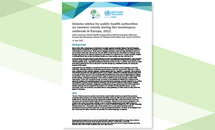
- In 2010, in The Impact Of Mass Gatherings & Travel On Flu Epidemics , we looked at a study published in BMC Public Health, that looked at and attempted to quantify the impacts of mass gatherings and holiday travel on the spread of an influenza epidemic.
- Since then we've looked at additional studies, including the 2012 six-part series (see Lancet: Mass Gatherings And Health), that have looked at the dynamics of disease transmission in these internationally attended events.
- In 2014's EID Journal: Respiratory Viruses & Bacteria Among Pilgrims During The 2013 Hajj we saw estimates that of the 2 million people from all over the world who attend the Hajj each year in Saudi Arabia, at least 60% of them develop respiratory symptoms there or during transit home.
Today the ECDC and the WHO have released a 6-page guidance document - primarily aimed at public health officials - on how to communicate the risk, and prevention advice, effectively and without engendering fear or stigma.
While most of the Monkeypox cases reported in this outbreak have involved men who self-identify as gay, bisexual, or men who have sex with men (MSM), they are not the only group at risk. It is important that public health create a safe and non-judgmental environment for those who may be afraid to report their infection.
I've reproduced the executive summary below, but you'll want to read the document in its entirety. I'll have a brief postscript after the break.
Guidance
14 Jun 2022
The aim of this document is to provide concise advice to public health authorities and guide their prevention, awareness-raising and behaviour change interventions before, during and after upcoming summer events.
Executive summary
This document will enable public health authorities to maximise opportunities for disseminating reliable information, advice and practical guidance to participants and minimise the public health risk from monkeypox. Although the main focus is monkeypox in the context of the current multi-country outbreak, much of the advice addresses good public health practices in general which may help prevent the transmission of a number of infectious diseases (e.g. HIV, sexually transmitted infections (STIs), etc.). This guidance also includes sections which can be used to formulate advice to business/venue owners and event organisers, as well as participants themselves. All advice can be adapted to the local context and the relevant audience and translated into national languages, as required.
Download
Interim advice for public health authorities on summer events during the monkeypox outbreak in Europe, 2022 - EN - [PDF-268.42 KB]
After two years of pandemic lockdowns and social distancing, people understandably want to mingle, socialize, and travel. We are essentially social creatures, and the forced isolation of the past two years has exacted a heavy toll.
Understandable or not, it doesn't change the fact that large gatherings of people provide a target-rich environment for infectious diseases looking for their next host.
And while the most immediate concern is constraining our burgeoning global Monkeypox outbreak, these venues also provide an effective platform to launch and distribute novel or seasonal flu viruses, new COVID variants, hepatitis A and meningitis, mosquito borne illnesses (like Dengue, Chikungunya, Zika & Yellow Fever), tuberculosis, mumps, measles, and chickenpox.
As we've already seen with unusual patterns of seasonal influenza and RSV, two years of COVID mitigation followed by a sudden reopening of society and international travel can spark unexpected changes in disease outbreaks.
Which suggests we may be in for more erratic, unseasonable, or unusual disease outbreaks in the months and years ahead.
